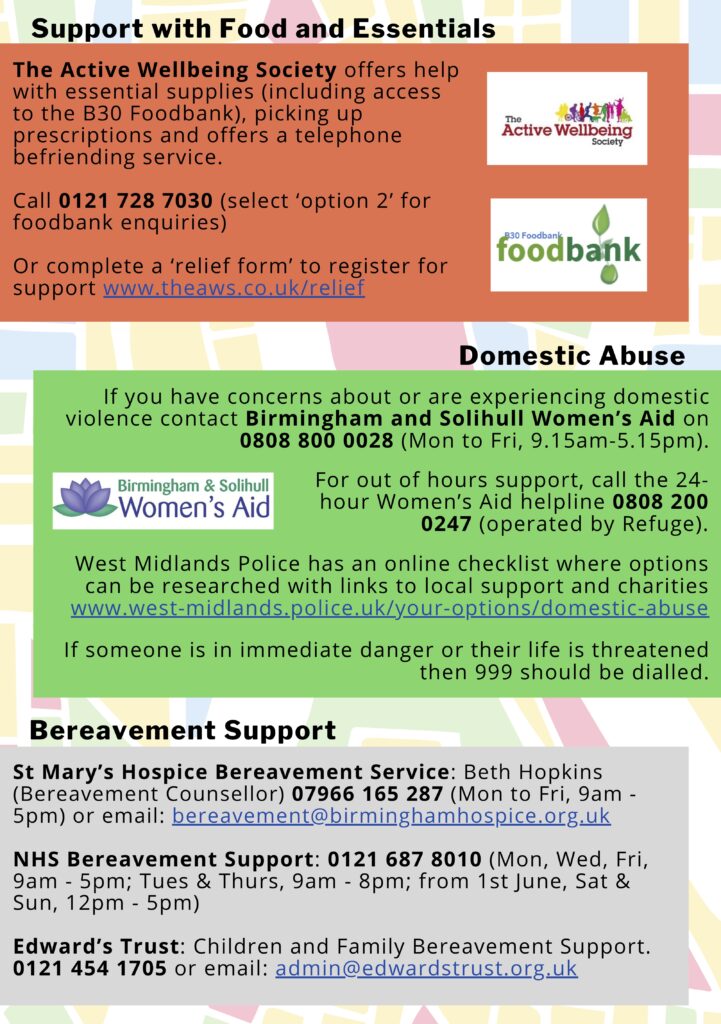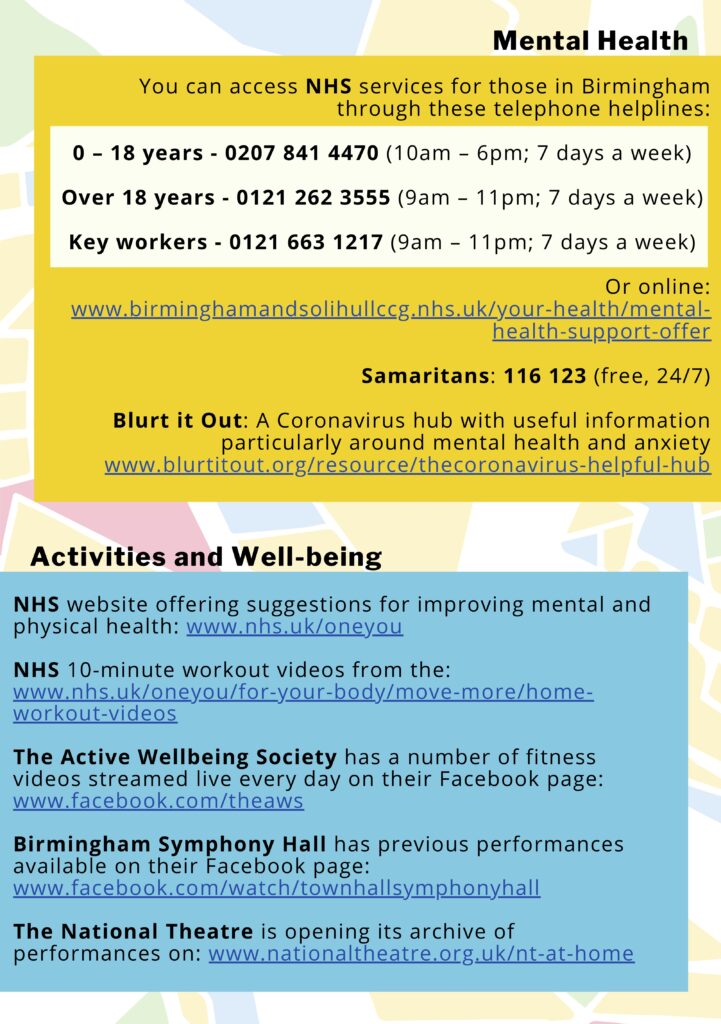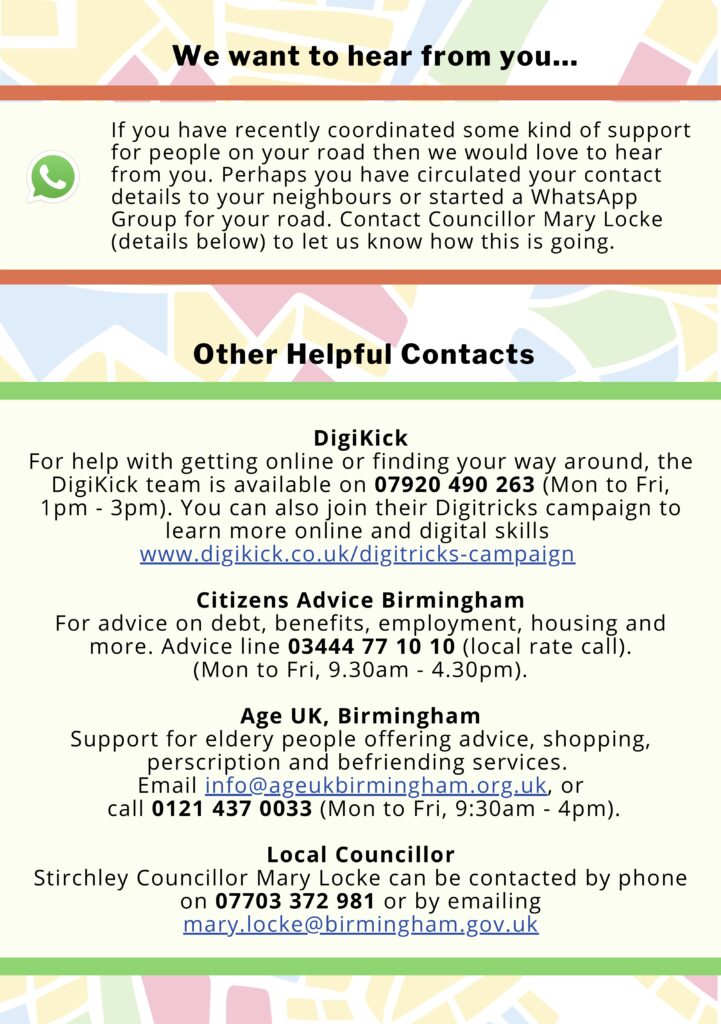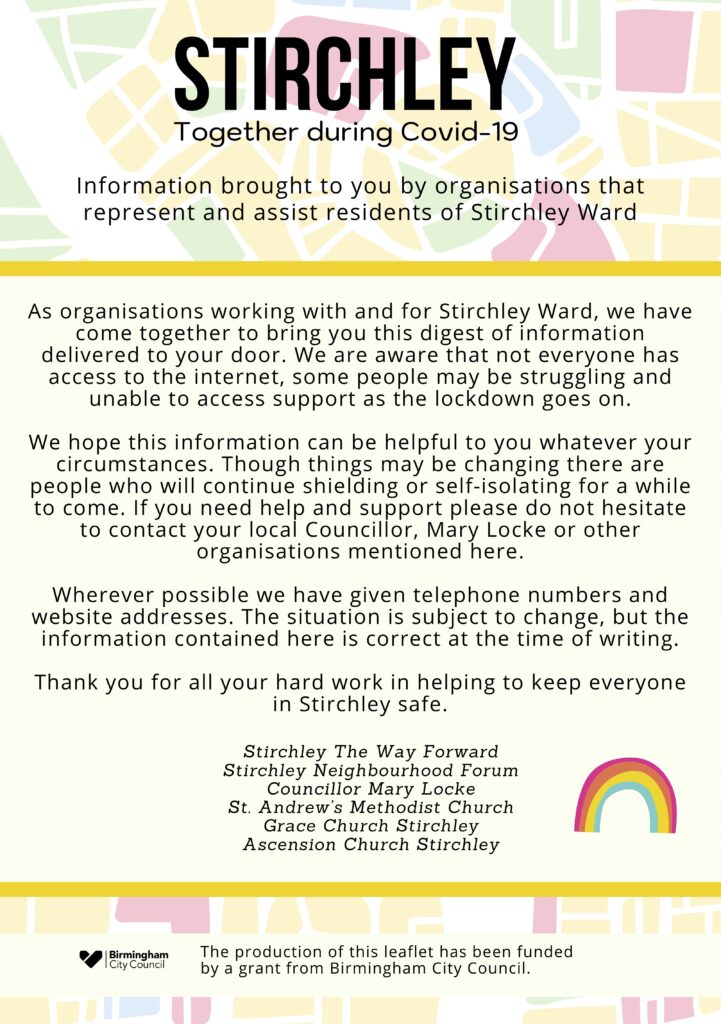A copy of this leaflet is making its way to each home in Stirchley – please check it hasn’t been swept up in your junk mail.



Representing Stirchley Residents
A copy of this leaflet is making its way to each home in Stirchley – please check it hasn’t been swept up in your junk mail.




Well, it’s June already. Not quite ‘sizzling June’ but give it time.
A planning application has come in for 1456 Pershore Road (opposite Stirchley School – used to be a newsagent) to turn from retail to hot food take away. Application no. 2020/01992/PA accessible on Planning Online.
The Forum policy is currently to oppose any such application, particularly as this is so near the school and the City Council has a policy of supporting healthy eating. Unfortunately the Planning Officer has given the impression that they will have no objection which seems a little strange. Please take a look and let us (and Planning) have your thoughts. Consultation ends 22nd June.
https://eplanning.birmingham.gov.uk/Northgate/PlanningExplorer/Home.aspx?formButton%253Areport1=Access+Planning+Online
There has been a new application for an alcohol license for 1469 Pershore Road (near Stirchley School currently Stir Stores) which has planning permission for use as a cafe during standard retail trading hours. A recent planning application for late night opening was withdrawn in the face of objections from people living nearby. Maybe those of you who did such a good job in putting together objections to the Mary Vale Road licensing application would take a look and let us know your thoughts? Closing date for comments is 17th June.
Many of you will have noticed that building work has restarted on the site. We are told that, subject to any changes in government advice, the proposed opening date is 9th July. They have had over 1,000 applications for 80 jobs.
Karen Cheney has informed us that there will be a virtual Ward Forum meeting on 10th June (please note that this is the Council meeting not Neighbourhood Forum meeting).
Items on the Agenda include;
She says, ‘We are starting a trial of holding virtual ward forum meetings and Stirchley Ward is one of the wards within the pilot. The Stirchley virtual ward forum meeting will be held on June 10th 6.30pm- 8pm
The virtual meetings will be run on “Teams Live Events” and in order to join the Stirchley Ward Forum meeting you need to use the link below
Link for joining Virtual Stirchley Ward Forum Meeting
A few things to be aware of
Please feel free to pass on my e-mail to others in Stirchley who you think would like to attend and do not hesitate to contact me if you have any further questions.
Monday 8th June should have been our June meeting.
We now have the facility to hold meetings using Google Meet. If you are interested in attending such a meeting please let us know and we will arrange a meeting and send you an invitation. This is very much in the nature of experiment but could be a bit of an adventure!
Likewise if anyone would like to take minutes it would be greatly appreciated!
I hope that you have found this of interest. Please contact us on stirchleyforumb30@gmail.com if you wish to join a meeting on 8th or wish to contact us for any other reason.
We have had the following email from Birmingham City Council and wanted to share the information…
In light of the impact COVID-19 is having on the economy, Birmingham City Council would like to ensure our residents are fully aware of all of the financial support which is being made available through the Government.
Going forward, we will issue a weekly update with details of any grants or relief which business can apply for with links to the relevant sources of information.
You can get £94.25 per week Statutory Sick Pay (SSP) if you’re too ill to work. It’s paid by your employer for up to 28 weeks. If you are staying at home because of COVID-19 you can now claim SSP. This includes individuals who are caring for people in the same household and therefore have been advised to do a household quarantine.
The Government is legislating for SSP to be paid from day 1, rather than day 4, of your absence from work if you are absent from work due to sickness or need to stay at home due to COVID-19. Once the legislation has been passed, this will apply retrospectively from 13 March.
If you have COVID-19 or are advised to stay at home, you can get an ‘isolation note’ by visiting NHS 111 online, rather than visiting a doctor. For COVID-19 cases this replaces the usual need to provide a ‘fit note’ (sometimes called a ‘sick note’) after 7 days of sickness absence.
If your employer intends to access the Coronavirus Job Retention Scheme, they will discuss with you becoming classified as a furloughed worker. This would mean that you are kept on your employer’s payroll, rather than being laid off. This will allow your employer to claim a grant of up to 80% of your wage for all employment costs, up to a cap of £2,500 per month. You will remain employed while furloughed. Your employer could choose to fund the differences between this payment and your salary, but does not have to. The Government plans for the Coronavirus Job Retention Scheme to run for at least three months from 1 March 2020, but will extend if necessary.
Whether you are currently in or out of work, if you are on a low income and affected by the economic impacts of COVID-19, you will be able to access the full range of the welfare system, including Universal Credit. From 6 April the Government will increase the standard allowance in Universal Credit and the basic element in Working Tax Credit for one year. Both will increase by £20 per week on top of planned annual up-rating. This will apply to all new and existing Universal Credit claimants and to existing Working Tax Credit claimants.
Your employer can ask you to stay at home or take unpaid leave if there’s not enough work for you. A lay-off is if you’re off work for at least 1 working day. Short-time working is when your hours are cut. There’s no limit for how long you can be laid off or put on short-time. You could apply for redundancy and claim redundancy pay if it’s been four weeks in a row or six weeks in a 13-week period. For lay-off pay entitlement and short-time working payments, you should get your full pay unless your contract allows unpaid or reduced pay lay-offs. If you’re unpaid, you’re entitled to guarantee pay.
This scheme will allow you to claim a taxable grant worth 80% of your trading profits up to a maximum of £2,500 per month for the next 3 months. This may be extended if needed. You can apply if you’re a self-employed individual or a member of a partnership and you:
If you’re self-employed, Income Tax payments due in July 2020 under the Self-Assessment system can be deferred to January 2021.
All businesses and self-employed people in financial distress, and with outstanding tax liabilities, may be eligible to receive support with their tax affairs through HMRC’s Time To Pay service. These arrangements are agreed on a case-by-case basis and are tailored to individual circumstances and liabilities.
If you are not eligible for SSP – for example if you are self-employed – and you have COVID-19 or are advised to stay at home, you can now more easily make a claim for Universal Credit or the new style Employment and Support Allowance. If you are eligible for new style Employment and Support Allowance, it will now be payable from day 1 of sickness, rather than day 8, if you have COVID-19 or are advised to stay at home.
Whether you are currently in or out of work, if you are on a low income and affected by the economic impacts of COVID-19, you will be able to access the full range of the welfare system, including Universal Credit. From 6 April the Government will increase the standard allowance in Universal Credit and the basic element in Working Tax Credit for one year. Both will increase by £20 per week on top of planned annual uprating. This will apply to all new and existing Universal Credit claimants and to existing Working Tax Credit claimants.
You should check your eligibility for Universal Credit, which is available for people in and out of work. Support for rental costs will be paid through Universal Credit. From April, we are increasing Local Housing Allowance rates to the 30th percentile of market rents. This applies to all private renters who are new or existing Universal Credit housing element claimants and to existing Housing Benefit claimants.
You can apply for Employment and Support Allowance (ESA) if you have a disability or health condition that affects how much you can work. It gives you money to help with living costs if you’re unable to work and support to get back into work if you’re able to. You can apply for ESA if you’re employed, self-employed or unemployed.
You may be entitled to up to 100% Council Tax Support if you or your partner is:
If you are of working age (other than those listed above) you will now have to make a contribution towards their Council Tax bill. As Council Tax Support will be calculated as a means tested discount, the amount each household will have to pay towards the Council Tax will depend on their individual household circumstances.
BCC has been allocated £17m through the Government’s COVID-19 Hardship Fund to deliver relief to those who are struggling to make council tax payments in the current economic climate. These reductions will be applied after any award of council tax support (CTS), and will not affect the CTS scheme itself or entitlement to any other benefits. The government expects authorities to reduce the bills of all working-age recipients of Council Tax Support by £150, or by a lesser amount if that is all that remains to be paid for the year. It does not expect taxpayers to have to apply for this reduction – authorities should already hold enough information to be able to award this automatically. It does not matter whether or not a taxpayer has been affected directly or indirectly by COVID-19. The government recommends an upfront payment, although it accepts that in some cases it may be better to spread it over the year.
Housing rental payments
Contact your landlord if you’re struggling to pay rent; they may be able to give a rent reduction or accept late payment. Make sure you get something in writing. The Government announced on 18 March that landlords will not be able to apply to court to evict tenants for at least three months. That includes if you rent from a private landlord, a housing association or the council. The new law is expected to come in very soon.
Mortgage payments
Mortgage lenders have announced they won’t apply to court to repossess homeowners for 3 months starting from 19 March. They will also allow a three-month payment holiday for those struggling to cover their mortgage because of coronavirus. Be aware that this option may mean your monthly mortgage payment goes up after the payment holiday ends. Check if you have insurance that will cover your mortgage payments instead. For example, mortgage payment protection insurance or through your current account
Free advice
You can receive free and impartial advice on a range of matters from organisations including:
A FINAL IMPORTANT REMINDER: if you have any concerns about coronavirus, all the important official advice to help restrict its spread and how to deal with any infection can be found on the NHS website.